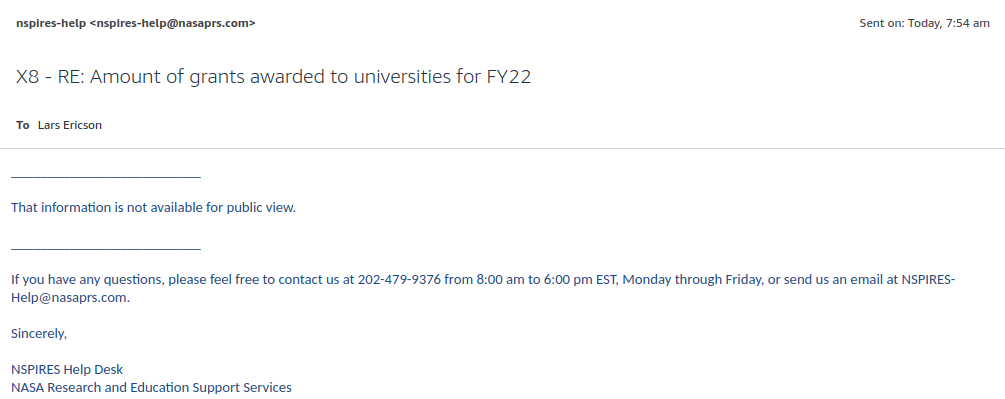Question:
Why doesn't NASA publish amounts of awarded grants?
Short Answer:
As a central location looking for existing grants NASA is pursuing. NASA publishes a year book of all their projects including grants and the status of each. Roses Selection Data, That's good to get the names of various projects. Drill down from there.
Answer:
Beyond the YEARBOOK of all their science activities including grants. Broadly this information is available through various channels such as
- NASA's official website
Navigate to the "For Researchers" section under the "Get Involved" tab or directly search for "grants."
Here is the query I did for Grants.
- The NASA Solicitation and Proposal Integrated Review Evaluation System (NSPIRES) from their main page.
you can search for various funding opportunities, solicitations, and announcements. You will need to create an account to access full details and apply for grants.
- Grants.gov
Use the search bar to look for NASA-related grants by entering keywords such as "NASA" or specific program names.
Grants.gov lists federal grants from all agencies, including NASA, and provides detailed information about each grant.
These platforms provide details on grant amounts, eligibility criteria, application processes, and deadlines.
- NASA Research Announcements (NRAs):
NRAs are periodically released and detail specific research areas for which NASA is seeking proposals. You can see these through their official cite and the NSPIRES site listed above.
Comments
From: Lars Ericson I was trying to use it to rank universities doing aerospace tech based on their NASA awards.
Easiest way would be to write a program and scrap it off the sites provided. Use python less than 100 lines of code. Here are the results I came away with. University/ name of award/ value of award in the million of dollars.
University \
Massachusetts Institute of Technology (MIT) MARTEMIS: Mars Architecture Research using Tag... $14 Million
Stanford University
Modular Self-Assembling Robotic Architecture (... $12 million
University of Texas, Austin
VENOM: Volatile Examining luNar prOspectors an... $10 million
- University of Maryland
SITIS: Subsurface Ice and Terrain In-situ Surv... $8 million
Virginia Polytechnic Institute and State Unive...
Project Draupnir $7 Million
University of Colorado, Boulder
Small Spacecraft Technology Development $ 6 million
- Georgia Institute of Technology
Aeronautical and Space Systems Research $ 5 million
